Sunday, 5 June 2005
Distance 35 km
Duration 8 hours 0 minutes
Ascent 181 m, descent 181 m
Map 34 of the TOP100 blue series (now superseded)
Topoguide (ref. 6552) Sentiers vers Saint-Jacques-de-Compostelle via Tours
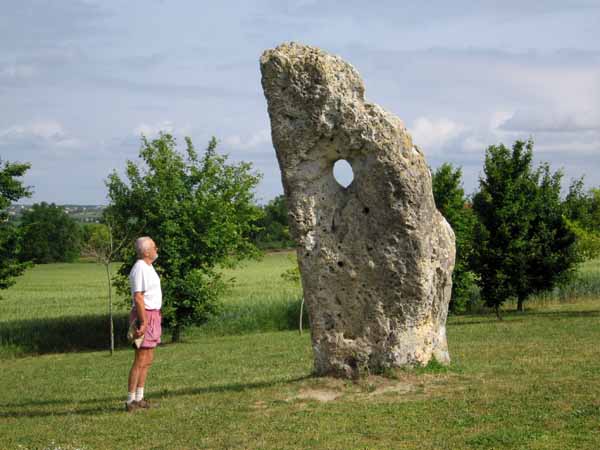
Sunday is always a hazardous day for walkers and this one certainly was, although largely through our own folly.
We left the slumbering town by a side-road and set off merrily down the GR, but soon began making our own way on farm paths through the fields, keeping off the N10 but not far from it. We felt fresh and it was easy walking.
Along the way we saw a tall smooth prehistoric stone, called a menhir, standing on end with a head-sized hole pierced in it. Nobody knows what it was for, but it must have been important to justify the effort.
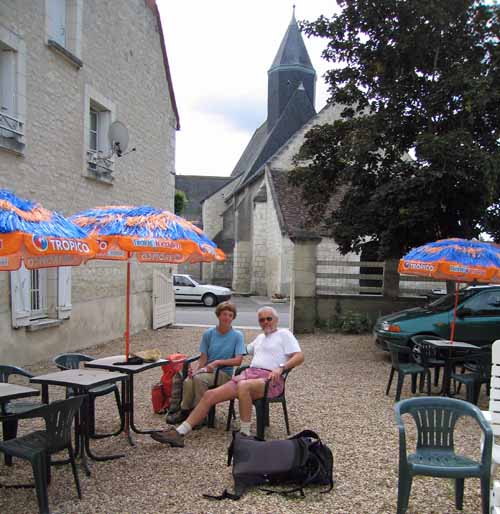
Draché looked unpromising as we came into it, but it actually had a well-patronised bar opposite the church and we stopped for delightful coffees under an umbrella in the side courtyard.
One of the other drinkers came up to talk to us and revealed that a son of Draché had emigrated to Australia and was now a baker in Canberra. We promised to look him up when we got home (we tried to, but failed).
Continuing on farm tracks, we quickly found ourselves in la-Celle-Saint-Avant and had our lunch in a bus shelter, the only shade we could find.
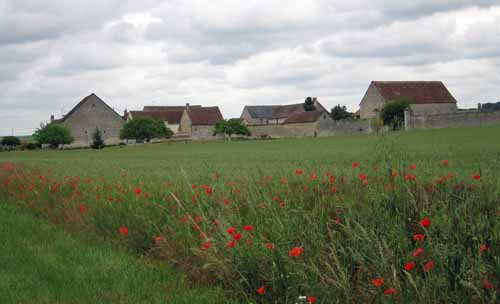
On to Port-de-Piles on the river Creuse, where we hoped to have an after-lunch coffee, we found that the village had gone into a decline, but it was only a few more kilometres of pleasant walking to the next village, les Ormes.
This did not look much more prepossessing than its neighbour as we entered. The streets had the grey, turned-in look typical of Sunday afternoon, but we managed to find a restaurant tucked away amongst them, just finishing with its lunchtime customers, and about to close after that.
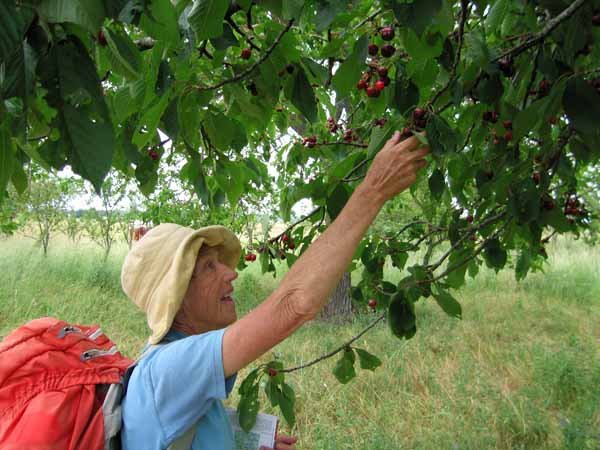
We had coffee there and discovered that the camping area was open on the river Vienne nearby, and that there was a pizzeria out on the highway that could provide an evening meal.
Nevertheless, and despite the fact that my blisters were once again troubling me, we decided that we had the energy to carry on to the next town, Dangé-Saint-Romain, about an hour’s walk away. This was in the days before we learned to be humble on Sundays.
When we got to Dangé, it seemed prosperous enough, with a wide square planted with flower-beds. But on closer inspection its charms faded. The camping ground was closed and there was nowhere to eat except for a tiny bar on the highway.
I asked the barman what he knew about accommodation at the next town, Ingrandes, and when he heard my English accent he scurried away and returned proudly with a very embarrassed teenager to speak to us in English. His boyish cheeks pink with mortification, all he managed was “yes?”. Out of pity I continued to speak in French but he knew nothing anyway, so we had no choice but to keep going and hope.
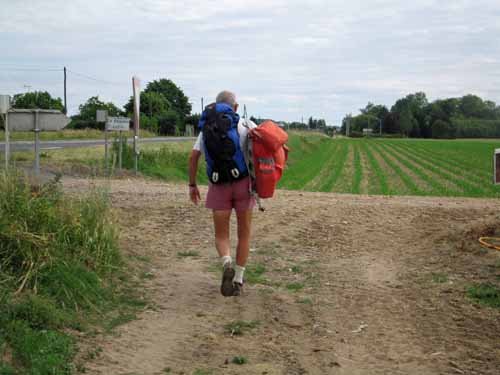
There was a good cycle path parallel to the road, but I could hardly walk with the pain of my blisters. I sobbed on Keith’s chest with the misery of it, and he took my pack to add to his.
Limping along in his wake, I thought how the day had changed from the carefree enjoyment of the morning to the present torment, all because of our own folly.
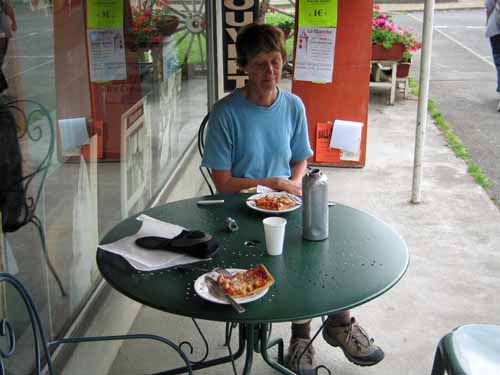
An hour and a half passed before we pulled wearily into Ingrandes. It was as lively as a graveyard and no sign of a camping ground.
A woman came past and told us that the camping ground was 2 km away on a side road, back in the direction we had come from.
As there was nowhere to eat in the village, she led us to the only functioning shop, a boulangerie, run by a friend of hers, who kindly warmed up some slices of pizza and quiche for us to eat at her outside table.
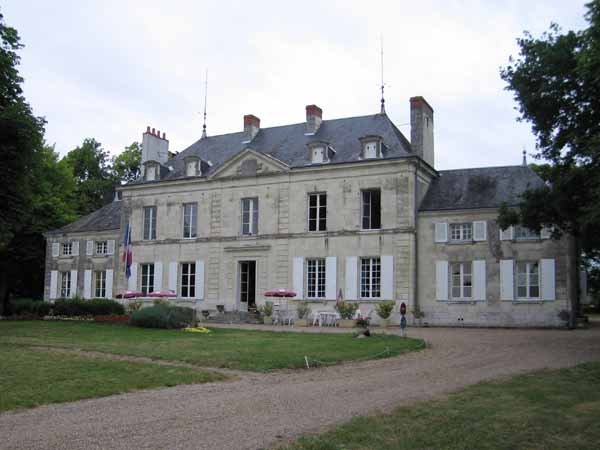
After this restoring pause the extra 2 km seemed easy, especially as they were on a small country lane.
As we rose towards the knoll of Saint-Ustre, all we could see, apart from a scatter of cottages, was an imposing château behind a high wall.
It turned out that the camping was actually in the château grounds – how the mighty have fallen, that they have to take in the likes of us to pay for the upkeep of the estate.
A few caravans and motor homes were dotted about on the sloping lawn in front of the entrance.
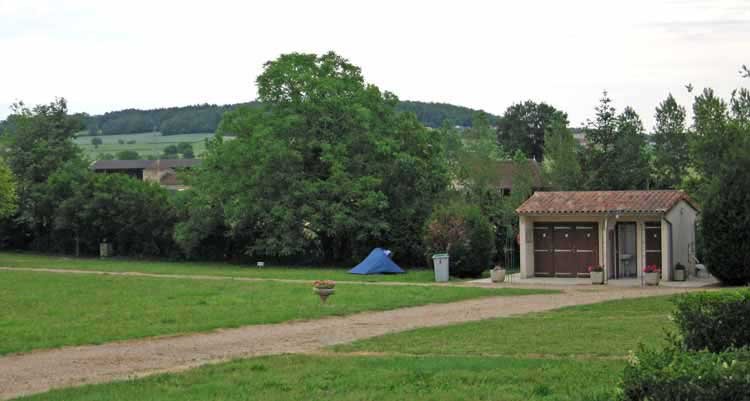
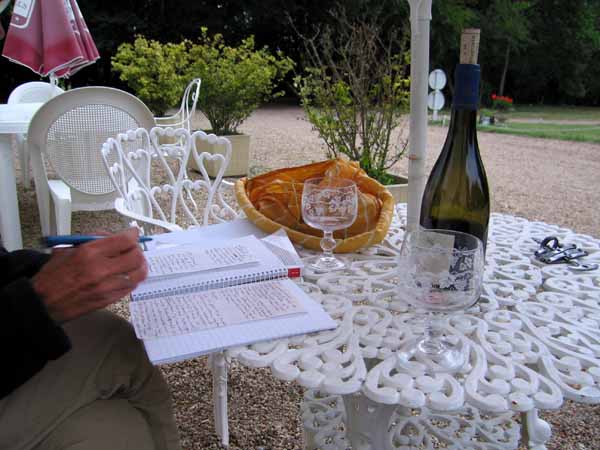
Our hostess was an ageing member of the minor nobility who have owned the place for the last 500 years.
She was elegant, gracious and slow-spoken (for my benefit I think) and pressed us to try a glass of the local vintage known as Granat.
Soon we were sitting on the terrace with large decorated goblets of wine, surveying the grounds as if we owned them, as dusk fell on the fields and woods beyond the wall.
So the day ended more happily than we deserved.
Previous day: Veigné to Ste-Maure-de-Touraine